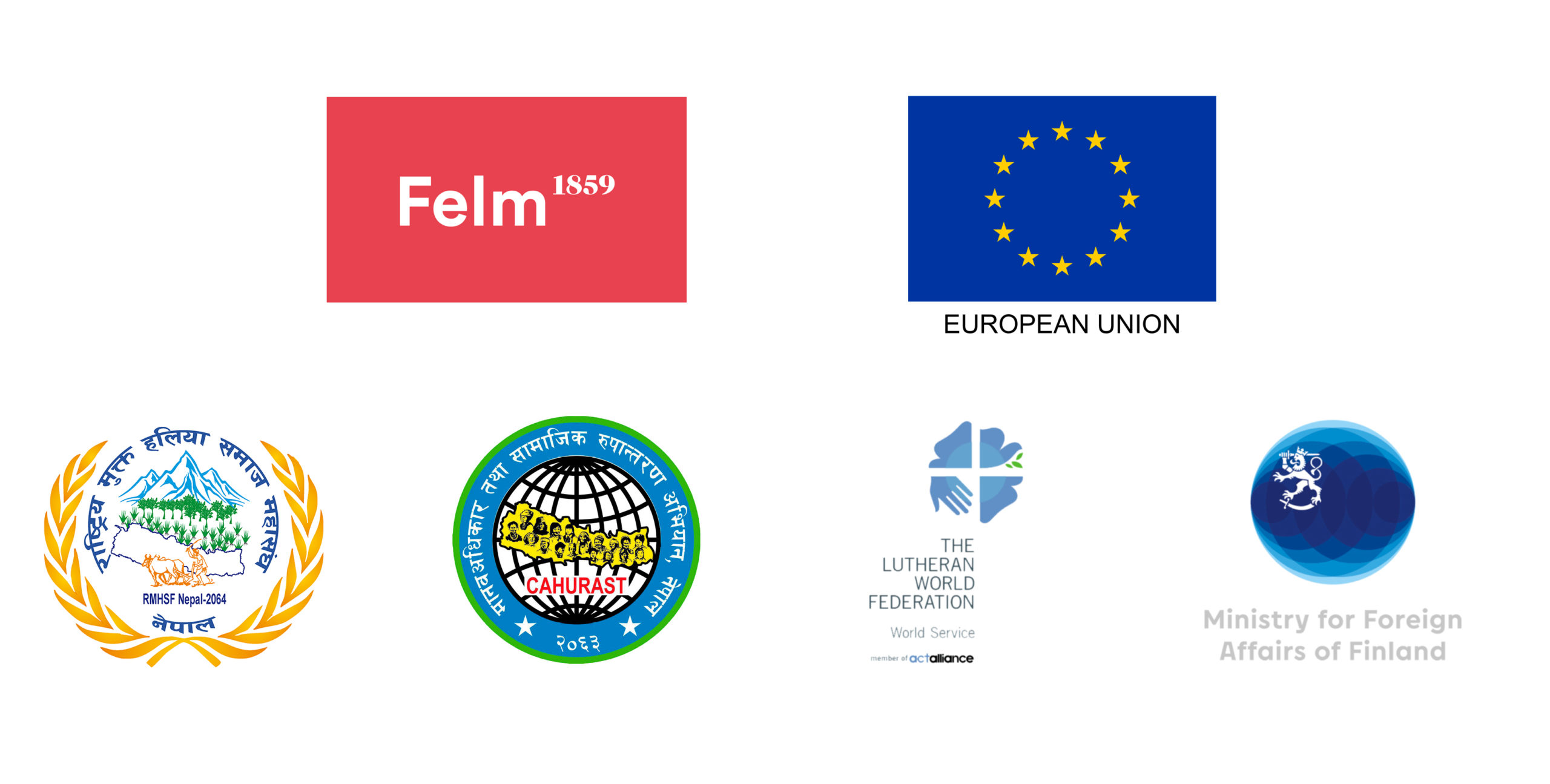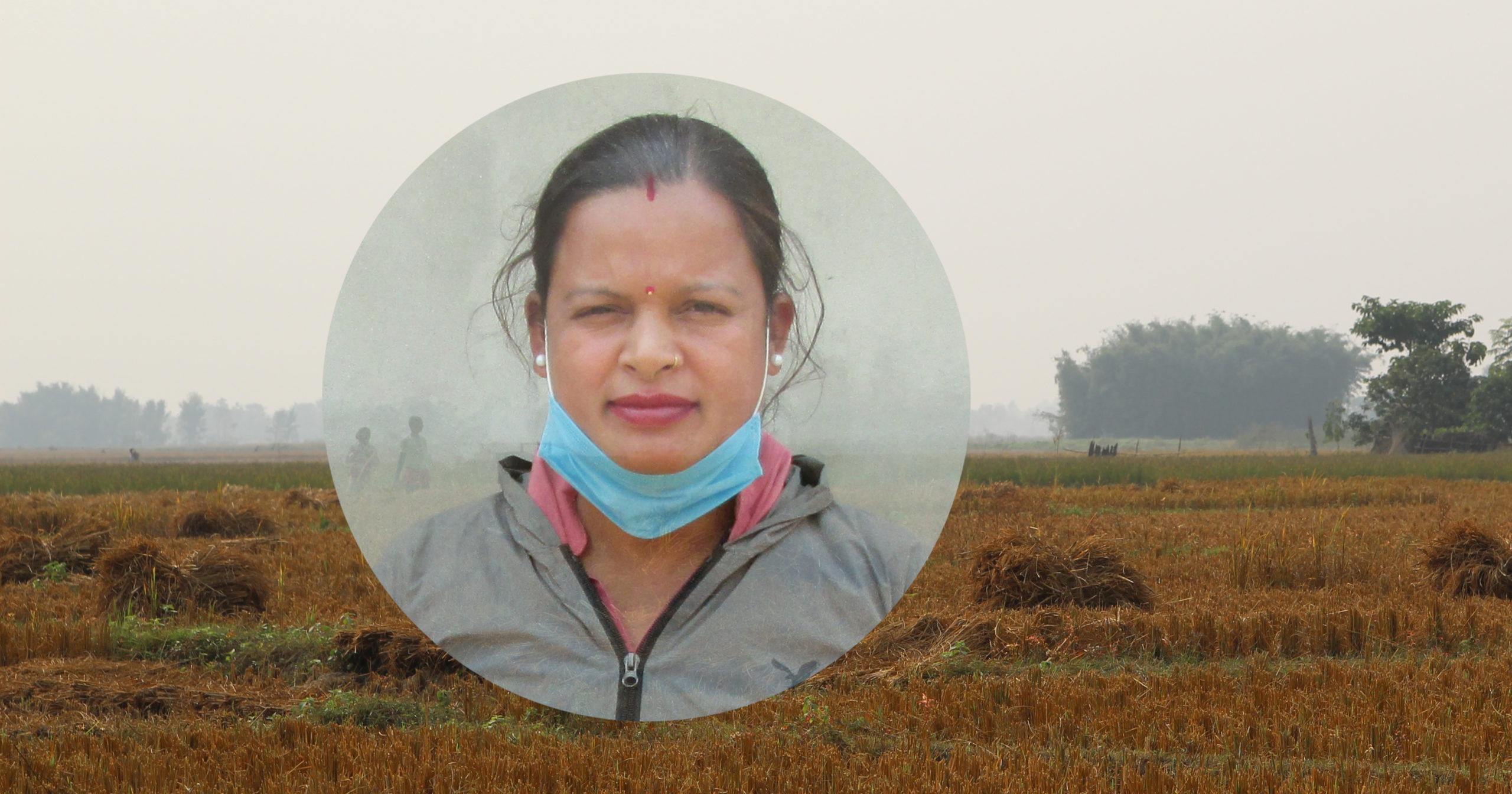“My mother, father and grandfather were victims of the Haliya practice, working as bonded laborers in other people’s lands.
Because of this, I have been involved in the Haliya and Dalit movement from an early age to end the pain of my family and of the whole freed Haliya society. 97 percent of freed-Haliyas are from the Dalit group; the so-called lower caste and untouchable minority of Nepal.
My name is Laxmi Kumari Luhar, and I am 31 years old. I live in Baghphata of Bhimdatta Municipality in Kanchanpur District, Farwestern Nepal. I am married to my husband who also comes from the Haliya and Dalit community.
“My parents were compelled to work without earning nothing else than just enough to feed their children”
My parents were compelled to work without earning nothing else than just enough to feed their children and sustain a living in on their farm. This is why, as a member of the Dalit and Haliya family, I joined the Haliya campaign 12 years ago. For a decade, I have been fighting against the Haliya system in the society and all forms of discrimination against Dalits.
I started my career as a Haliya facilitator, organizing and empowering Haliya families to fight against discrimination. Currently, I am working as a data collector for the Haliya Federation(RMHSF-N).
Different forms of discrimination against Haliyas and Dalits in the society continue to exist. I have identified people who are still working under the old Haliya practice and filed their cases to the authorities. As a result, these complainants were freed from slavery, and they also received land and financial support as compensation. My family has also received a class A Haliya identity card, which entails our family for financial support in house construction and land purchase. This kind of support is crucial for people who have always worked on other people’s lands and owned no land of their own.
“Complainants were freed from slavery, and they also received compensation”
The state has not been able to bring enough Dalit and Haliya friendly policies and programs. Many freed Haliyas are not yet to get different opportunities to increase their own income and employment. The government of Nepal has declared the release of Haliyas, but still not all freed Haliyas have been identified and provided these rehabilitation packages by the state.
The records of many freed Haliyas have been missing because they were not well informed about the data collection, and many of them were out of country as seasonal laborers in India and other countries.
What makes me particularly sad is that Haliya women are still suffering from double and triple pain of Haliya labor and caste untouchability. Social empowerment and inclusion of Haliya and Dalit women has not been achieved, and they face multiple discrimination*.
“I want to see an end to discrimination and labor exploitation of Haliya women”
I still remember the discrimination caused by my landlord while as a young girl I was working both in the house and field of the landlord with my mother and father. I have also suffered the pain of not being allowed to fetch water in public water taps, just because I am a Dalit.
I am happy to know that the ADHICAR project is starting in my home municipality. I think the project will further help in solving the problems of the freed Haliyas. I also hope that the project will play an instrumental role to amplify the voices, choices and rights of the freed Haliya, women and people with disabilities.
It is the responsibility of the state to protect, promote and fulfill the rights of Haliya women. We need to make Haliya women more aware of their own rights. I want to see an end to discrimination and labor exploitation of Haliya women, I want to see a harmonious and just society.”
A consortium of four Nepali and European organisations are implementing a new European Union funded project in the Farwestern parts of Nepal. The consortium includes Rastriya Mukta Haliya Samaj Federation Nepal (RMHSF-N), Lutheran World Federation (LWF), Campaign for Human Rights and Social Transformation Nepal (CAHURAST), and Felm. With the support of the European Union, the consortium is partnering up to combat discrimination of freed Haliyas, particularly persons with disabilities and women, who face the double burden of discrimination.
* Read more about multiple discrimination from a Joint Submission to the UN Universal Periodic Review (2020) by The Lutheran World Federation (LWF), Finish Evangelical Lutheran Mission (Felm), FinnChurch Aid (FCA), Samari Utthan Sewa (SUS), Rastriya Mukta Haliya Samaj Federation Nepal(RMHSF-N), Campaign for Human Rights and Social Transformation (CAHURAST), and theLutheran Community Welfare Society (LCWS), Joint Submission number 29.
This article has been produced with the financial assistance of the European Union. The contents of this text are the sole responsibility of the project partners and can in no way be taken to reflect the views of the European Union.
एक्टिभिष्ट लक्ष्मी लुहार मुक्त हलिया समुदायको पीडा अन्त्य गर्न चाहन्छिन
“मेरो आमा, बुबा र हजुरबुवा हलिया प्रथाको सिकार थिए, अन्य व्यक्तिको भूमिमा वन्धकको रुपमा काम गर्थे । यसै कारणले गर्दा म आफ्नो परिवार र सम्पूर्ण मुक्त हलिया सुमदायका पिडा अन्त्य गर्न सानै उमेरदेखि नै हलिया र दलित आन्दोलनमा संलग्न भएकि छु। ९७ प्रतिशत मुक्त हलियाहरु दलित समुह भित्र पर्दछन ,कथित तल्लो जात र नेपालको छुवाछूत अल्पसंख्यक।
मेरो नाम लक्ष्मी कुमारी लुहार हो, र म ३१ बर्षको भए । म पश्चिम नेपालको कञ्चनपुर जिल्लाको भीमदत्त नगरपालिकाको बागफाटामा बस्छु। मैले मेरो श्रीमानसँग विवाह गरे उनि पनि हलिया र दलित सुमदायका ब्यक्ति थिए ।
मेरा अभिभावकहरू आफ्ना बच्चाहरूको पालनपोषण गर्न र खेतमा जीविका चलाउनको लागि अरु केही आर्जन नगरी काम गर्न बाध्य थिए। यसैकारण, दलित र हलिया परिवारको सदस्यको रूपमा मैले १२ बर्ष अघि हलिया अभियानमा सहभागी भएँ। दशकौ देखि म समाजमा हलिया प्रथा र दलित बिरुद्धका सबै प्रकारका बिभेदहरुको बिरुद्ध संघर्ष गर्दैछु।
विभेद विरुद्ध लड्न, हलिया परिवारहरुलाई संगठित र सशक्त बनाउन मैलै हलिया सहजकर्ताको रुपमा आफ्नो क्यारियर सुरु गरे । हाल म हलिया महासंघको सूचना संकलकको रुपमा काम गर्दैछु ।
समाजमा हलिया र दलित माथि बिभिन्न किसिमका विभेदको अस्तित्व रहेको छ। मैले पुराना हलिया अभ्यास अन्तर्गत अझै काम गरिरहेका व्यक्तिहरूलाई पहिचान गरेकोछु र अधिकारीहरु समक्ष मुद्धा हालेकिछु, नतिजा स्वरूप, ति उजुरी गर्नेहरू दासत्वबाट मुक्त भए, र उनीहरूले क्षतिपूर्तिको रूपमा जग्गा र आर्थिक सहयोग पनि पाए। मेरो परिवारले (क)वर्गको हलिया परिचय पत्र प्राप्त गर्यो, जसले घर निर्माण र जग्गा खरीदमा आर्थिक सहयोगको लागि हाम्रो परिवारलाई संलग्न गर्दछ। यस प्रकारको सहयोग व्यक्तिहरूको लागि महत्वपूर्ण छ जसले सँधै अन्य व्यक्तिको भूमिमा काम गरेका छन् र उनीहरूको आफ्नै भूमि छैन।
राज्यले पर्याप्त दलित र हलिया मैत्री नीति र कार्यक्रम ल्याउन सकेको छैन। धेरै मुक्त हलियाले आफ्नो आय र रोजगार वृद्धि गर्न बिभिन्न अवसरहरू प्राप्त गर्न सकेका छैनन्। नेपाल सरकारले हलियाको मुक्तिको घोषणा गरिसकेकोछ, तर अझै मुक्त भएका सबै हलियाको पहिचान हुन सकेन र राज्यले पुनःस्थापना प्याकेजहरू प्रदान गरिसकेको छैन।
धैरै मुक्तहलियाहरुको तथ्यांकमा नाम छुट हुन गएकोछ । किनकि उनीहरु लाई सुचना संकलनको बारेमा राम्रो जानकारी थिएन,र ती मध्ये धेरै भारत र अन्य देशहरूमा मौसमी मजदुरको रूपमा देश बाहिर थिए।
मलाई खास गरी दुखी बनाउने कुरा के हो भने हलिया महिलाहरु अझै पनि हलिया श्रम र जातिय छुवाछूतको दोहोरो र तेहोरो दु: ख भोगीरहेका छन। सामाजिक सशक्तिकरण, हलिया र दलित महिलाको समावेशिता हासिल हुन सकेको छैन, र उनीहरुलाई धेरै भेदभावको सामना गर्नुपर्दछ।
म अझै पनि मेरो जमिन्दारले गरेको भेदभावको सम्झना गर्दछु जब सानो छँदा म मेरो आमा र बुबासँग जमिनदारको घर र जग्गा दुवैमा काम गर्थें। दलित भनि सार्वजनिक पानीको धारामा पानी ल्याउन नदिएको पीडा पनि मैले भोगेको छु।
मलाई थाहा छ कि ADHICAR परियोजना मेरो गृह नगरपालिकामा शुरू हुँदैछ। मलाई लाग्छ कि प्रोजेक्टले मुक्त हलियाहरूको समस्या समाधान गर्न मद्दत गर्दछ। मलाई यो पनि आशा छ कि यस परियोजनाले मुक्त हलिया, महिला र अपांगता भएका व्यक्तिको आवाज, विकल्प र अधिकारहरूको बृद्धि गर्न महत्वपूर्ण भूमिका खेल्नेछ।
हलिया महिलाको अधिकारको संरक्षण, संवर्धन र परिपुर्ति गर्ने राज्यको दायित्व हो। हामीले हलिया महिलाहरूलाई उनीहरूको अधिकारको बारेमा अझ सजग बनाउनु पर्छ। म हलिया महिलाको विभेद र श्रम शोषणको अन्त्य हेर्न चाहन्छु, म एक सामंजस्यपूर्ण र न्यायपूर्ण समाज हेर्न चाहन्छु।
यो ब्लग यूरोपेली संघको आर्थिक सहयोगमा बनाईएको हो। यस पाठका सामग्रीहरू परियोजना साझेदारहरूको एकमात्र उत्तरदायित्व हो र कुनै पनि हिसाबले यूरोपियन युनियनको विचार प्रतिबिम्बित गर्दैन ।


